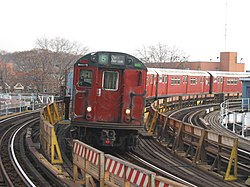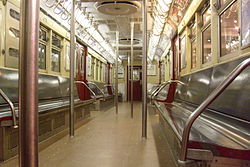R33 (New York City Subway car)
| R33 | |
|---|---|

An R33 train on the
|
|

Interior of an overhauled R33 car.
|
|
| In service | 1962–2003 |
| Manufacturer | St. Louis Car Company |
| Built at | St. Louis, Missouri |
| Constructed | 1962–1963 |
| Refurbishment | 1987–1991 |
| Scrapped | 2001–2004 2013 (cars used as refuse motors) |
| Number built | 500 cars (250 pairs) |
| Number in service | (42 in work service) |
| Number preserved | 11 |
| Number scrapped | 447 |
| Formation | Pairs |
| Fleet numbers | 8806–9305 |
| Operator(s) | New York City Subway |
| Specifications | |
| Car body construction | LAHT carbon steel |
| Car length | 51.04 feet (15.56 m) |
| Width | 8.75 feet (2,667 mm) |
| Height | 11.86 feet (3,615 mm) |
| Doors | 6 per car |
| Maximum speed | 55 mph (89 km/h) |
| Weight | 72,900 lb (33,100 kg) (post-rebuild) |
| Traction system | GE 17KG192AE2/3 (9076–9305 formerly Westinghouse) |
| Power output | Westinghouse 1447JR/GE 1257E1, 100 hp (74.6 kW) per axle |
| Electric system(s) | 600 V DC Third rail |
| Current collection method | Contact shoe |
| Bogies | none |
| Braking system(s) | WABCO, "SMEE" (electrodynamic) |
| Safety system(s) | Emergency Brakes |
| Track gauge | 4 ft 8 1⁄2 in (1,435 mm) |
The R33 was a New York City Subway car that was built by St. Louis Car Company in 1962 and 1963. They are a "follow-up" or supplemental stock for the “A” Division’s R29s and closely resemble them. The cars were also referred to as R33MLs (R33 Main Line) to distinguish them from the R33WFs.
The first set of R33 cars was placed in service on the 1 train on November 15, 1962. Five hundred cars were built and served on all IRT subway lines. In 1972 they became the first "A" division cars to be retrofitted with air conditioning, and by 1982 all R33 cars had received air conditioning. The cars were also rebuilt between 1986 and 1991.
Before they were rebuilt, the R33 cars were grouped as follows:
From 1987 until early 1991, the R33 cars were overhauled and rebuilt by the MTA's 207th Street and Coney Island Overhaul Shops. All cars were refitted with General Electric equipment. Existing General Electric cars received New York Air Brake Newtran brake packages; the former Westinghouse cars received an updated brake package from the Westinghouse Air Brake Company.
After rebuilding, R33 cars served on the 2, 4, and 5 trains, and occasionally on the 7 train.
...
Wikipedia
